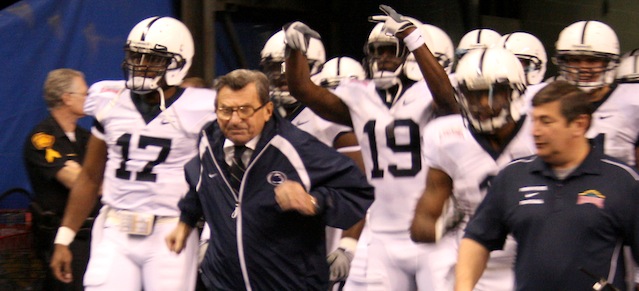
What would you do if you were Joe Paterno? If it was reported to you that your assistant coach was sexually abusing a minor, would you act differently? In his recent op-ed for the NY times, David Brooks suggests that the answers to these questions are not as straightforward as we might believe. While we wish to think that we would speak up, the data says otherwise. When pressed to act by a moral dilemma, the vast majority of people do nothing at all (humorously illustrated below). Brooks details numerous explanations psychologists give to this inexplicable human failure: Normalcy Bias, Motivated Blindness, or the Bystander Effect. All of this is really just describes what Christianity has historically called “original sin” or the “Bondage of the Will”. The implication of all this is that most people would have done exactly what Joe Paterno did – turn a blind eye to something he did not want to deal with.
This addresses what is the biggest problem regarding the current non-stop coverage of Joe Paterno’s involvement in the Penn State scandal. The guiding assumption has been that we, the commentators, are qualitatively different from Joe Paterno. We would have acted differently. The more we believe in the inherent goodness of humanity (or better, the goodness of ourselves!), the more likely we are to demonize those who fail to realize this inherent goodness. (And similarly, why do all the pictures of Paterno make him look like a crazy old man?). We point the finger and cast the first stone. All the while, it seems that no one is introspectively asking the $64,000 question, “how can I prevent sexual abuse from happening?”.

First came the atrocity, then came the vanity. The atrocity is what Jerry Sandusky has been accused of doing at Penn State. The vanity is the outraged reaction of a zillion commentators over the past week, whose indignation is based on the assumption that if they had been in Joe Paterno’s shoes, or assistant coach Mike McQueary’s shoes, they would have behaved better. They would have taken action and stopped any sexual assaults. Unfortunately, none of us can safely make that assumption…
People are really good at self-deception. We attend to the facts we like and suppress the ones we don’t. We inflate our own virtues and predict we will behave more nobly than we actually do. As Max H. Bazerman and Ann E. Tenbrunsel write in their book, “Blind Spots,” “When it comes time to make a decision, our thoughts are dominated by thoughts of how we want to behave; thoughts of how we should behave disappear.”
In centuries past, people built moral systems that acknowledged this weakness. These systems emphasized our sinfulness. They reminded people of the evil within themselves. Life was seen as an inner struggle against the selfish forces inside. These vocabularies made people aware of how their weaknesses manifested themselves and how to exercise discipline over them. These systems gave people categories with which to process savagery and scripts to follow when they confronted it. They helped people make moral judgments and hold people responsible amidst our frailties.
But we’re not Puritans anymore. We live in a society oriented around our inner wonderfulness. So when something atrocious happens, people look for some artificial, outside force that must have caused it — like the culture of college football, or some other favorite bogey. People look for laws that can be changed so it never happens again.
Commentators ruthlessly vilify all involved from the island of their own innocence. Everyone gets to proudly ask: “How could they have let this happen?”
The proper question is: How can we ourselves overcome our natural tendency to evade and self-deceive. That was the proper question after Abu Ghraib, Madoff, the Wall Street follies and a thousand other scandals. But it’s a question this society has a hard time asking because the most seductive evasion is the one that leads us to deny the underside of our own nature.

COMMENTS
8 responses to “Are You Better Than Joe Paterno? David Brooks Thinks You’re (Probably) Not”
Leave a Reply













Thank God for articulate people who can express what other’s of us have been feeling for over a week now! Both Todd Brewer and David Brooks 🙂
I am a self righteous coward…and therefore, when I see others nailed, I feel good about myself…of course the truth is that I am covering my own guilt by pointing the other’s failure. I go about neurotically and vicariously trying to compensate for my own mess….it is very juicy to find escape goats among other humans…Joe Paterno now is a leper… and we dismiss any decent thing that he may have done at Penn State….we are soooooooooooooo sick….let alone the propaganda of the media cowards…not to mentions the coldness, hardness, of Paterno’s so called friends….and as you know, the lawyers are the piranas going to eat him alive….and I am deeply sad for Joe….where does he go now?
Who is going to treat him as a human….O Jesus, make a house call visit to Joe….help him…
Two thoughts. One, you should read, Mistakes are Made, But Not by Me. Great book on why we do not do a great about estimating what we do, or what we have done. There are whole chapters on social workers, doctors, politicians and others that lie about what they have done and why those people think they haven’t lied (hint, they actually have changed their memories to protect their views of themselves.)
Second, I know there are lots of thoughts about what we as individuals would do. But you know what, hundreds if not thousands of calls a day are made to social services and police about child abuse. My wife works at a school (a very large, but quite poor elementary school). It is a fairly rare week when social services are not called because of signs of abuse or neglect or social services calling the school doing back ground or follow up.
Yes some of those calls end up being nothing after the research. But there are many people that do call. And you know what, there are a lot of angry parents that come to the school because those calls are not nearly as anonymous that they are supposed to be. So the schools have a number of restraining orders against disgruntled parents.
So I get that we should not assume we will do the right thing when it comes up. But I also think we should not dismiss that anyone would do the right thing. Many people to the right thing every day.
Adam, thanks for the thoughts. The book “Mistakes Were Made…” has been featured several times on this website, sort of serving as a companion to Brooks’ own “Social Animal” see: here, here and here!
And you’re right to point out that some people do intervene on behalf of others. But part of me wonders how many people it takes to know something before it’s actually reported. Based upon the studies Brooks cites, only 16% or fewer of people responded to morally objectionable situations. To put it a little differently, how many families have a dark secret they keep from everyone else?
Hi,
I’ve read your site for the past few months now, and I very much appreciate your perspective on things.
I’m a Penn State graduate, and I actually just recently moved away from State College after living there for 15 years. There are all sorts of things I could point to that the media is portraying incorrectly in this situation, but I think you hit the nail on the head. The sanctimony of the media (and others) in this case is too much for me to bear.
Personally, I’m not convinced that Paterno did or didn’t do the right thing. I honestly think there’s far too many unanswered questions in the case for anyone to actually make that call at the moment. I also wonder if even if this instance were reported if it would have made that big of a difference in the way things played out. The PA law enforcement agencies seem to have been largely asleep at the wheel for a very long time as far as Sandusky is concerned.
But, regardless, I agree with your premise. We are addicted to the notion of progress, and a lot of people really do think that humanity as a whole is getting better. I really think people assume that there are sins that we progressed are way past as a society. Things like this come to light, and it reminds people of how futile our efforts can be.
Todd, thanks for bringing this to our attention. David Brooks is getting up there with Forde and Rosenbladt on Mbird’s Mt. Rushmore, isn’t he? Is there a more thoughtful commentator on current life?